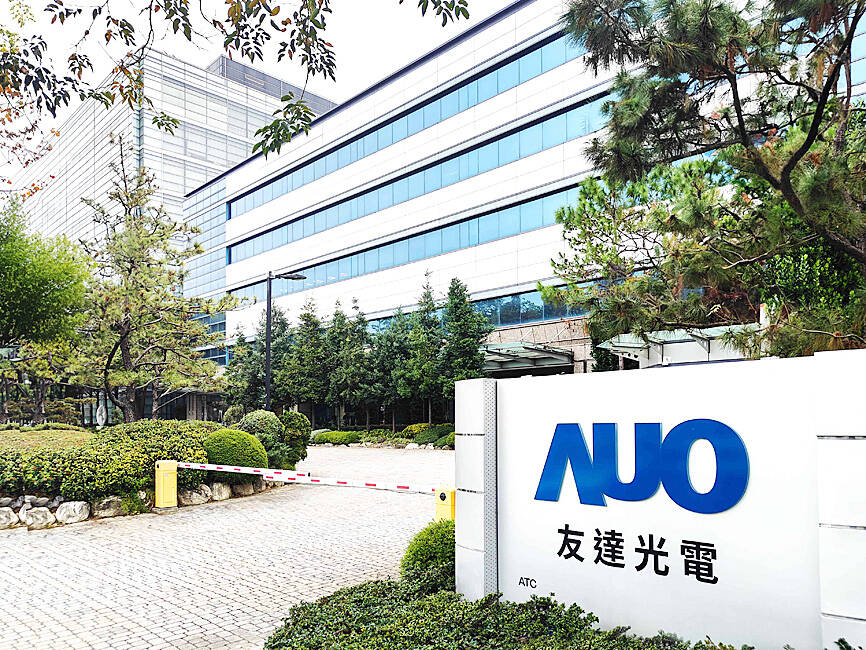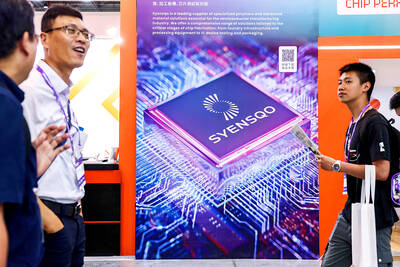AUO Corp (友達) yesterday said it has agreed to sell its idled manufacturing facility and land in Tainan to Micron Technology Inc for NT$7.4 billion (US$231.8 million) as the company shifts strategy to reduce the impact from the boom-and-bust flat-panel display industry.
The company expects to book NT$4.17 billion in disposal gains from the sale, it said in a Taiwan Stock Exchange filing.
The Tainan factory produced color filters used in monitors, notebook computers and flat-panel TVs before being shut down last year, as AUO sought to optimize its asset utilization.

Photo courtesy of AUO Corp
The company has been striving to diversify and broaden its business scope in the past few years to minimize the impact of the LCD industry’s volatility.
The company aims to boost sales contribution from its non-panel business to half of its total revenue by 2027, AUO chairman Paul Peng (彭双浪) said last month.
In addition to the Tainan plant, AUO also agreed to sell the facilities owned by its solar energy subsidiary AUO Crystal Corp (友達晶材) in Taichung for NT$700 million, the flat panel maker said in a separate filing. The deal would bring about NT$544 million in disposal gains for the company, it said.
Micron Technology, the world’s No. 3 memorychip maker, said in a statement yesterday that it plans to deploy new wafer testing capacity by converting AUO’s Tainan factory into a front-end wafer testing facility, which would support its DRAM chip manufacturing expansions in Taichung and Taoyuan.
Market researcher Trendforce Corp (集邦科技) said the transaction with Micron would help AUO improve its overall financial structure this year.
AUO has been in the red for more than two years and reported net losses of NT$3.76 billion in the first half of this year.

SEMICONDUCTOR SERVICES: A company executive said that Taiwanese firms must think about how to participate in global supply chains and lift their competitiveness Taiwan Semiconductor Manufacturing Co (TSMC, 台積電) yesterday said it expects to launch its first multifunctional service center in Pingtung County in the middle of 2027, in a bid to foster a resilient high-tech facility construction ecosystem. TSMC broached the idea of creating a center two or three years ago when it started building new manufacturing capacity in the US and Japan, the company said. The center, dubbed an “ecosystem park,” would assist local manufacturing facility construction partners to upgrade their capabilities and secure more deals from other global chipmakers such as Intel Corp, Micron Technology Inc and Infineon Technologies AG, TSMC said. It

EXPORT GROWTH: The AI boom has shortened chip cycles to just one year, putting pressure on chipmakers to accelerate development and expand packaging capacity Developing a localized supply chain for advanced packaging equipment is critical for keeping pace with customers’ increasingly shrinking time-to-market cycles for new artificial intelligence (AI) chips, Taiwan Semiconductor Manufacturing Co (TSMC, 台積電) said yesterday. Spurred on by the AI revolution, customers are accelerating product upgrades to nearly every year, compared with the two to three-year development cadence in the past, TSMC vice president of advanced packaging technology and service Jun He (何軍) said at a 3D IC Global Summit organized by SEMI in Taipei. These shortened cycles put heavy pressure on chipmakers, as the entire process — from chip design to mass

People walk past advertising for a Syensqo chip at the Semicon Taiwan exhibition in Taipei yesterday.

NO BREAKTHROUGH? More substantial ‘deliverables,’ such as tariff reductions, would likely be saved for a meeting between Trump and Xi later this year, a trade expert said China launched two probes targeting the US semiconductor sector on Saturday ahead of talks between the two nations in Spain this week on trade, national security and the ownership of social media platform TikTok. China’s Ministry of Commerce announced an anti-dumping investigation into certain analog integrated circuits (ICs) imported from the US. The investigation is to target some commodity interface ICs and gate driver ICs, which are commonly made by US companies such as Texas Instruments Inc and ON Semiconductor Corp. The ministry also announced an anti-discrimination probe into US measures against China’s chip sector. US measures such as export curbs and tariffs